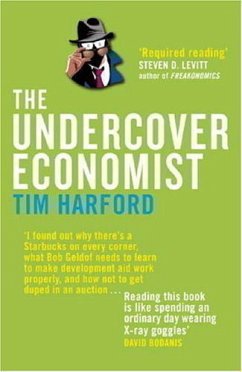Who makes most money from the demand for cappucinos early in the morning at Waterloo Station? Why is it impossible to bget a foot on the property ladder? How do the Mafia make money from laundries when street gangs pushing drugs dont? Who really benefits from immigration? How can China, in just 50 years, go from the worlds worst ever famine to being in the middle of one of the greatest economic revolutions of all time, lifting a million people out of poverty a month? Looking at familiar situations in unfamiliar ways, THE UNDERCOVER ECONOMIST is a fresh explanation of the fundamental principles of the modern economy, illuminated by examples from the streets of London to the booming skyscrapers of Shanghai to the sleepy canals of Bruges. Leaving behind textbook jargon and equations, Tim Harford will reveal the games of signals and negotiations, contests of strength and battles of wit that drive not only the economy at large but the everyday choices we make.
Ein unkonventioneller Blick auf wirtschaftliche und gesellschaftliche Verhältnisse, der zu einigen unerwarteten Ergebnissen führt. Die britische Antwort auf den US-Bestseller Freakonomics.
Ein unkonventioneller Blick auf wirtschaftliche und gesellschaftliche Verhältnisse, der zu einigen unerwarteten Ergebnissen führt. Die britische Antwort auf den US-Bestseller Freakonomics.

